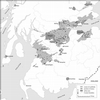Home >
Stories > The Story of Scottish Coal - Images sequence
The Story of Scottish Coal

Preston Island: remains of a coal mine, includi...
|

Map of Central Scotland showing the distributio...
|

View taken in 1900 of the erecting shop Anderso...
|

Pithead baths at Arniston Colliery in Midlothia...
|

Auchengeich Colliery near Glasgow in c.1950, wh...
|

Gas holders at Granton Gas Works in Edinburgh, ...
|

Bothwell Station in Glasgow in 1920, showing th...
|

Sketch of the reconstructed third shaft at Baro...
|

An artist's impression of Scotland's fi...
|

A drawing by Egon Riss of Scotland's most s...
|

Killoch Colliery near Ochiltree in Ayrshire, wh...
|

Bilston Glen Colliery at Loanhead near Edinburg...
|

Demolition of Scotland's last superpit, Mon...
|

View of Number 3 shaft at Barony Colliery in Ay...
|

View of the 'A'-frame headgear of Numbe...
|

View in 1999 of the pithead buildings at Lady V...
|

Lady Victoria Colliery, built in the mid-1890s....
|

View of the pithead at Lady Victoria Colliery n...
|

Lady Victoria Colliery has now become the highl...
|
|